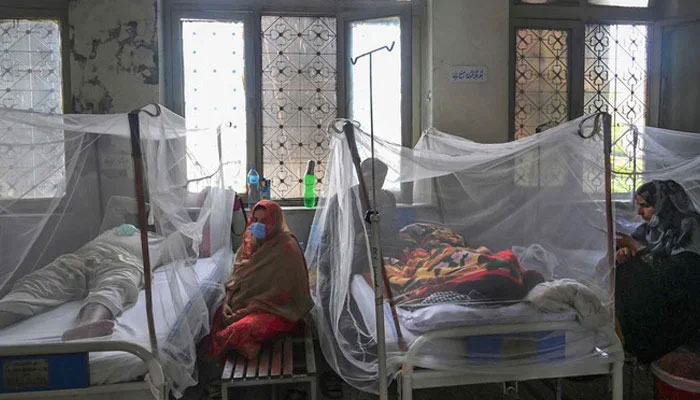Population in the region at greater risk of facing dengue outbreak
Rawalpindi:As many as 38 patients belonging to the twin cities of Islamabad and Rawalpindi have already tested positive for dengue fever while the peak season for transmission of the infection in this region of the country is yet to be set in.
Data collected by ‘The News’ on Tuesday has revealed that to date, a total of 24 patients have tested positive for dengue fever from Rawalpindi district while 14 from the federal capital which hints that the population in the region may face a severe dengue fever outbreak in the coming days.
It is worth mentioning here that at this point in time in 2023, a total of 11 patients were confirmed positive from Rawalpindi district while seven from the federal capital. The confirmation of dengue fever patients before the peak transmission season proves the existence of adult ‘aedes’ mosquitoes in abundance in the region.
Epidemiological findings reveal that the greater number of patients in a region may cause faster spread of dengue fever as it is one of the major risk factors behind a dengue fever outbreak. Major risk factors include rains, rising temperature, infected travelers or patients, heaps of garbage and rubbish dumps along with larvae of dengue fever vector and adult mosquitoes. The teams of district health departments in Rawalpindi and the federal capital have already been finding larvae of ‘aedes’ mosquitoes, the vector for dengue fever in abundance which is also alarming.
According to District Coordinator Epidemics Prevention and Control Cell at District Health Authority Rawalpindi Dr. Sajjad Mehmood, the public sector hospitals in Rawalpindi have already tested 22 patients positive for dengue fever so far of which two confirmed patients are undergoing treatment at the hospitals, one at Holy Family Hospital and the other at Benazir Bhutto Hospital.
Majority of the dengue fever patients so far reported from Rawalpindi are residents of areas in Rawalpindi Municipal Corporation, Rawalpindi Cantonment Board and Potohar Town, peri urban areas. Data collected by ‘The News’ also reveals that well over 80 per cent of the total patients from the region were reported in the last one-and-a-half month hinting that the population in the region may face a severe outbreak of the infection in its peak season, from August to October.
It is worth mentioning here that every year, the first cases of dengue fever in this region of the country appear by the end of July or in the middle of August while sporadic cases, reported before August do not cross the figure of 10 generally.
Public sector hospitals in Rawalpindi have already started receiving a greater number of dengue fever suspects as to date, well over 2,800 suspects have reached the hospitals for management. Health experts say that the situation is under control at the moment but in the coming days, the situation may get worse if proper preventive measures are not taken well in time by the health department and the individuals.
Experts believe that the population of ‘aedes aegypti’, the dengue fever vector fluctuates with temperature, rainfall and humidity. Dengue infections are generally reported during or after rain, as an outcome of rise in vector population. It is time to take preventive measures more seriously to avoid breeding and growth of mosquitoes as the population of ‘aedes aegypti’ is high in the rainy season and the conditions in monsoon in the region become much favourable for mosquitoes to grow.
-
 Everything We Know About Jessie J's Breast Cancer Journey
Everything We Know About Jessie J's Breast Cancer Journey -
 Winter Olympics 2026: What To Watch In Men’s Hockey Today
Winter Olympics 2026: What To Watch In Men’s Hockey Today -
 Winnie Harlow Breaks Vitiligo Stereotypes: 'I'm Not A Sufferer'
Winnie Harlow Breaks Vitiligo Stereotypes: 'I'm Not A Sufferer' -
 Apple Martin Opens Up About Getting 'crazy' Lip Filler
Apple Martin Opens Up About Getting 'crazy' Lip Filler -
 Why Did OpenAI Remove One Crucial Word From Its Mission Statement?
Why Did OpenAI Remove One Crucial Word From Its Mission Statement? -
 Prince William Warned His Future Reign Will Be Affected By Andrew Scandal
Prince William Warned His Future Reign Will Be Affected By Andrew Scandal -
 Amy Madigan Reflects On Husband Ed Harris' Support After Oscar Nomination
Amy Madigan Reflects On Husband Ed Harris' Support After Oscar Nomination -
 Is Studying Medicine Useless? Elon Musk’s Claim That AI Will Outperform Surgeons Sparks Debate
Is Studying Medicine Useless? Elon Musk’s Claim That AI Will Outperform Surgeons Sparks Debate -
 Margot Robbie Gushes Over 'Wuthering Heights' Director: 'I'd Follow Her Anywhere'
Margot Robbie Gushes Over 'Wuthering Heights' Director: 'I'd Follow Her Anywhere' -
 'The Muppet Show' Star Miss Piggy Gives Fans THIS Advice
'The Muppet Show' Star Miss Piggy Gives Fans THIS Advice -
 Sarah Ferguson Concerned For Princess Eugenie, Beatrice Amid Epstein Scandal
Sarah Ferguson Concerned For Princess Eugenie, Beatrice Amid Epstein Scandal -
 Uber Enters Seven New European Markets In Major Food-delivery Expansion
Uber Enters Seven New European Markets In Major Food-delivery Expansion -
 Hollywood Fights Back Against Super-realistic AI Video Tool
Hollywood Fights Back Against Super-realistic AI Video Tool -
 Meghan Markle's Father Shares Fresh Health Update
Meghan Markle's Father Shares Fresh Health Update -
 Pentagon Threatens To Cut Ties With Anthropic Over AI Safeguards Dispute
Pentagon Threatens To Cut Ties With Anthropic Over AI Safeguards Dispute -
 Samsung Galaxy Unpacked 2026: What To Expect On February 25
Samsung Galaxy Unpacked 2026: What To Expect On February 25




